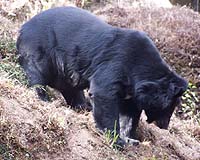| . |  |
. |
Paris (AFP) Sept 29, 2010 An alliance of conservationists and international donors on Wednesday unveiled a map of six areas on the Mediterranean rim aimed at guiding policy for preserving precious habitats and threatened species. The 251-page "ecosystem profile" was launched by Critical Ecosystem Partnership Fund, including the US-based NGO Conservation International, the World Bank, the government of Japan and the Global Environment Facility (GEF). It highlights six "priority areas" that, its authors hope, will encourage protection against human incursion, unsustainable tourism, water extraction, pollution and other perils. They include more than three million hectares (6.7 million acres) of Mediterranean wetlands and desert in Egypt and Libya, home to more than 100 endemic plant species and the critically endangered Egyptian tortoise, Testudo kleinmanni. Other regions include the Atlas mountains of Morocco and the Tell Atlas of Algeria and Tunisia; the Orontes Valley and Lebanon Mountains in Lebanon, Syria and Turkey; lakes, mountains and coastlines in the Southwest Balkans; and Turkey's Taurus Mountains, which contains examples of almost all of the Mediterranean's varied habitats. Guven Eken of Turkey's nature association, Doga Dernegi, which led the work, said the Mediterranean was "hugely complicated" for conservation work. "It covers 34 countries with numerous different languages, alphabets, cultures and religions," Eken said in a press release. "It is also seriously threatened, with only five per cent of native habitat remaining... Much damage has already been done, but finally we have a strategy which transcends national boundaries and can protect this incredible place." The initiative is being supported by what is described as a first instalment of 10 million dollars to help biodiversity conservation over the next five years. Under Target 7b of the Millennium Development Goals, UN states pledged to achieve by 2010 "a significant reduction" in the rate of wildlife loss. Yet every expert assessment points to accelerating declines in many species, ravaged by habitat loss, hunting or the suspected impact of climate change. The Mediterranean basin is home to nearly half a billion people and visited by more than 220 million tourists each year. Members of the UN's Biodiversity Convention meet in Nagoya, Japan, from October 18 to 29, with the task setting new targets to halt the downward spiral.
Share This Article With Planet Earth
Related Links Darwin Today At TerraDaily.com
 Reformed hunter battles to save Bangladesh's wildlife
Reformed hunter battles to save Bangladesh's wildlifeSrimongal, Bangladesh (AFP) Sept 27, 2010 Sitesh Ranjan Deb says his transformation from hunter to conservationist was triggered 20 years ago when he was attacked by a Himalayan black bear while out stalking deer. Sitesh, from northeastern Bangladesh, stumbled on the sleeping beast. It lashed out, severely damaging his face and one eye, and only emergency surgery saved his life. During many long months of recovery, Sitesh decide ... read more |
|
| The content herein, unless otherwise known to be public domain, are Copyright 1995-2010 - SpaceDaily. AFP and UPI Wire Stories are copyright Agence France-Presse and United Press International. ESA Portal Reports are copyright European Space Agency. All NASA sourced material is public domain. Additional copyrights may apply in whole or part to other bona fide parties. Advertising does not imply endorsement,agreement or approval of any opinions, statements or information provided by SpaceDaily on any Web page published or hosted by SpaceDaily. Privacy Statement |